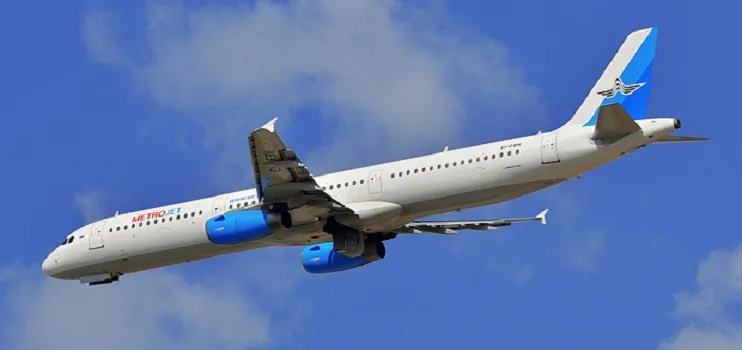
Metrojet A321 crashes killing all 224 aboard
Oct 30, 2015

In October 2015, Metrojet Flight 9268, an Airbus A321, tragically crashed in the Sinai Peninsula shortly after taking off from Sharm el-Sheikh, Egypt, en route to St. Petersburg, Russia. All 224 passengers and crew on board lost their lives in the disaster, marking it as one of the deadliest aviation incidents in recent history. The crash was later attributed to a bomb explosion, leading to widespread condemnation and significant security concerns regarding air travel in the region. The incident profoundly impacted international aviation security measures and highlighted the ongoing risks associated with terrorism.
The tragic crash of Metrojet Flight 9268 on October 31, 2015, remains one of the deadliest aviation disasters in recent history. The Airbus A321 was en route from Sharm El Sheikh, Egypt, to St. Petersburg, Russia, when it went down in the Sinai Peninsula, resulting in the loss of all 224 lives aboard. This catastrophic incident has since raised numerous questions regarding aviation safety and security measures, as well as the implications for the travel industry.
Incident Overview
Metrojet Flight 9268 was carrying a mix of tourists returning from a vacation in Egypt. At approximately 23 minutes after takeoff, the aircraft lost contact with air traffic control. The plane, which was cruising at an altitude of 31,000 feet, rapidly descended and crashed in a remote area of the Sinai Peninsula. The sudden loss of communication and the subsequent crash triggered immediate investigations into the potential causes.
Investigation Findings
Investigators quickly determined that the cause of the crash was a bomb that had been planted on board. The Islamic State of Iraq and the Levant (ISIL) later claimed responsibility for the attack, marking a significant escalation in the threat posed by terrorist organizations to aviation security. This incident prompted an international response, leading to enhanced security protocols at airports, especially in regions deemed to be high-risk.
Impact on Air Travel
The Metrojet A321 crash had profound implications for the aviation industry. Following the tragedy, many countries issued travel warnings and advisories for travel to Egypt. The Russian government suspended all flights to Egypt, leading to a significant drop in tourism, which is a crucial part of the country's economy. Airlines globally reevaluated their security measures, particularly for flights departing from or arriving in countries with known terrorist activities.
Safety Regulations and Changes
In the wake of the Metrojet crash, several key changes were implemented to enhance aviation safety:
| Change | Description |
|---|---|
| Increased Security Screening | Airports around the world adopted stricter screening processes for passengers and baggage to prevent the introduction of explosives on board. |
| Enhanced Intelligence Sharing | Countries increased collaboration to share intelligence regarding potential threats to aviation and monitor high-risk individuals. |
| Improved Crisis Management Protocols | Airlines and governments developed better crisis management strategies to respond effectively to aviation emergencies. |
The Aftermath for Families
The families of the victims faced unimaginable grief following the crash of Metrojet A321. Many sought justice and answers regarding the circumstances that led to the tragedy. Legal actions were initiated against various parties, including the airline and the security agencies involved in airport screenings. This event highlighted the need for comprehensive support systems for families affected by aviation disasters.
Global Security Measures
In response to the Metrojet crash, global aviation authorities began to reassess and strengthen security measures. Some of these measures included:
- Advanced Screening Technologies: Airports began to implement more sophisticated screening technologies, including body scanners and advanced imaging systems, to detect concealed explosives.
- Behavioral Analysis Training: Security personnel received training to identify suspicious behavior among passengers, improving the ability to preempt potential threats.
- Overhaul of Security Protocols: A comprehensive review of existing security protocols was conducted, leading to the establishment of new standards for risk assessment and management.
Conclusion
The crash of Metrojet Flight 9268 was a stark reminder of the vulnerabilities inherent in air travel. While significant strides have been made in improving aviation security since this tragedy, the impact of such devastating events continues to resonate within the industry and among travelers worldwide. Ongoing vigilance and adaptation to emerging threats remain paramount in ensuring the safety of air travel.
In summary, the Metrojet A321 crash, which killed all 224 aboard, not only highlighted the urgent need for enhanced security measures but also underscored the importance of international cooperation in combating terrorism. As the aviation landscape continues to evolve, the lessons learned from this incident will remain invaluable in shaping future policies and practices.
Related Articles

Explore Thailand: The Best Islands to Visit for Paradise, Adventure, and Relaxation

The Ultimate Guide to the Best Islands in Thailand for Your Next Getaway

Do babies need passports? How to get a passport for a newborn

How to get a U.S. passport fast: here’s how to expedite the process

What is Mobile Passport Control: 5 reasons why you should use it

SENTRI vs. Global Entry: A detailed guide

Do you need a passport to go to the Bahamas? Let’s find out

Do you need a passport to go to Mexico? A detailed guide

Do you need a passport to go to Canada? We got the answer

Do You Need a Passport for a Cruise: An Essential Travel Guide

Booster Seat Requirements: All the Rules to Follow in Your Rental Car

What Are the World’s Most Powerful Passports, and How Does Yours Rank?

How to Take a Passport Photo at Home: A Helpful Guide

You've got to have heart! Southwest's new livery

Your opinion: Should water be free on low cost carriers?

Young women bolder than guys as solo travellers
